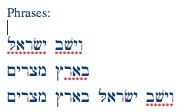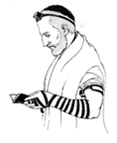h |B
Elevating Others ©
By Dr. Akiva Gamliel Belk
Parshat Behar - Bechukotai
Leviticus 25.1- 27.34
To view the Hebrew Test click here.
This Devri Torah Parshat is in the loving memory of Mr. Gary Lee Belk and Mr. Donald Wayne Belk, may they rest in peace.
As a young boy at the age of 9 I began cutting neighbors lawns for spare money. My father spoke to several neighbors and before long I had about five good size yards to push mow the grass and trim. Shortly after that I got a paper route. I lied about my age. Before long my brothers each had a paper route in my name. Gabor Yitzchok was 8 and Raphael Levy was 7. We carried these paper routes everyday of the week. At the age of 11 I began wording for the Denver Public Schools as a sweeper boy in the mornings before school and in the evenings after school. I got my Social Security number at the age of 11. The school district began deducting social security from my .90 cents per hour. When I was 17 I worked at the local Arby's Roast Beef sometimes until 1:00 am on school nights during high school. The day before I entered the military Daddy had me stacking hay on a flat bed truck then into the barn later. The other farmers actually told my father to let me have the rest of the day off because I was going into the military. When I came home on leave we cut tobacco leafs by hand.
Our parents owned rental property, thank G-d! Every time a renter moved my father would say boys we gotta go clean and paint that rental. My brothers and I helped our father with all kinds of maintenance work from young ages. We worked on roofs, we painted, we cleaned, we helped with construction, with poured concrete, with carried mortar, we trimmed trees and split wood. We worked very hard as kids.
Needless to say when I went into the advertising and printing business our sons immediately were included. They waited counter after school, made copies, designed business cards, stationary, flyers, folded, collated, handed fliers out door to door plus much more. They were also quite young.
It is good for young adults to learn responsibility by working at various jobs but NOT kids.
Ha Torah Says, If your brother becomes destitute and cannot sustain himself among you are to support him as a foreigner or temporary resident, so that he can continue among you... If your brother among you becomes destitute and sells himself to you, you must not force him to do slave labor. Let him stay with you as a hired hand or temporary resident; he may work until the Year of Jubilee. Then he and his children are to be released from you, and he may return to his clan and his ancestral property. They are not to be sold as slaves, because they are my slaves I brought out of the land of Mitzriam. You are not to rule over them harshly but to fear your G-d!
When my father was 5 he became an orphan in the hills of Kentucky. He went to live with a harsh uncle who beat him often. Daddy recalled how he had to get up each morning and start a fire in the fireplace.
Dear ones when I was studying this Torah Parshat I realized that I treated my children a bit to sternly when growing up. I required them to work hard after school. I expected a to much from there mother. When Naomi Leah and I married. We began working hard, real hard. We were so dedicated to sharing Torah on the internet. This was for a real good cause yet I was too driven. About 7 or 8 years ago the Rebbetzin needed to back off. I agreed. I remained very stead fast until about 20 months. I was forced to slow down because of injuries. It is so difficult and painful to drive to physical therapy and doctors appointments along with home therapy and lessons and audio discussions. As many of you know this past year the Rebbetzin tried to come back by teaching a class on modesty. She is still trying, G-d Bless her! Then, G-d Forbid she was struck with cancer, then lymphedema and carpal tunnel. It has been a very difficult road to walk sense then...
The stress on us has been enormous! We have greatly slowed down! We are going to need to slow down even more.
In this weeks Parshat we Observe an important principle. I like the translation of the Holman christian Standard Bible for this Passuk. Holman translates, You are not to rule over them [slaves] harshly but to fear your G-d! Vayikra 25.46 Two Words stand out.
hD≤r"ti Tee Rih Deh meaning to rule; to subdue, subjugate, tyrannize over... The Letter Tav is added. This is a special sign that tells us to take a closer look. The Gematria of hD≤r"ti Tee Rih Deh is 609. When the same Letter are rearranged they spell rDæh]t≤ Teh Hih Dawr, meaning favor. Mystically we learn how we are not to treat a servant and how we are to treat a servant.
˚r≤p;B] Bih Faw Rehk meaning to crush, oppress, break, oppress The Gematria of ˚r≤p;B] Bih Faw Rehk is 302. This is the same Gematria as bræq; Kaw Rahv meaning to come near to. Again we learn that one is not to crush a servant but to draw the servant near to them.
hD≤r"ti Tee Rih Deh meaning to rule; to subdue, subjugate, tyrannize over.
609 = h5 d4 r200 t400
rDæh]t≤ Teh Hih Dawr, meaning favor.
609 = r200 d400 h500 t400
˚r≤p;B] Bih Faw Rehk meaning to crush, oppress, break, oppress
302 = ˚20 r200 p80 b2
bræq; Kaw Rahv meaning to come near to
302 = b2 r200 q100
This is a message to all of us. This tells us there is a limit of work that one should expect from their slave. This also tells us that there is a limit of what one should expect from children. There is a limit of what one should expect from their spouse. There is a limit we should expect from our selves. Now, each of us should be seriously dedicated to learning and studying Ha Torah. Yet there is a point where one must draw the line. There is a point that one should not physically cross. I cannot say that I have ever met anyone who rigorously or ruthlessly studies Ha Torah. There are some extremely dedicated Torah Scholars. Yet to place anyone of them in this category would be a mistake.
Still when one slows down do to sickness or injury that is O.K. Our Creator Does not expect us to maintain the same scheduled as in our youth. Avraham handed over responsibilities to Yitzchok when he was 140. Yitzchok attempted to hand over responsibilities when he was 123. He handed over responsibilities when he was 145. Yaakov handed over responsibilities when he was 130. All that I am saying is it is normal to take time off when one is sick or injured. It is normal to slow down. It is normal to hand responsibilities to a trained talmud. I am also saying there is a line that each of us must pay attention to with regards to what we physically can do. While on one hand we strive to be righteous and holy we must use common sense.
This lesson teaches us to not treat ourself or others harshly.
Blessings Health, Prosperity, Kindness and Peace,
Dr. Akiva Gamliel















Recent Comments